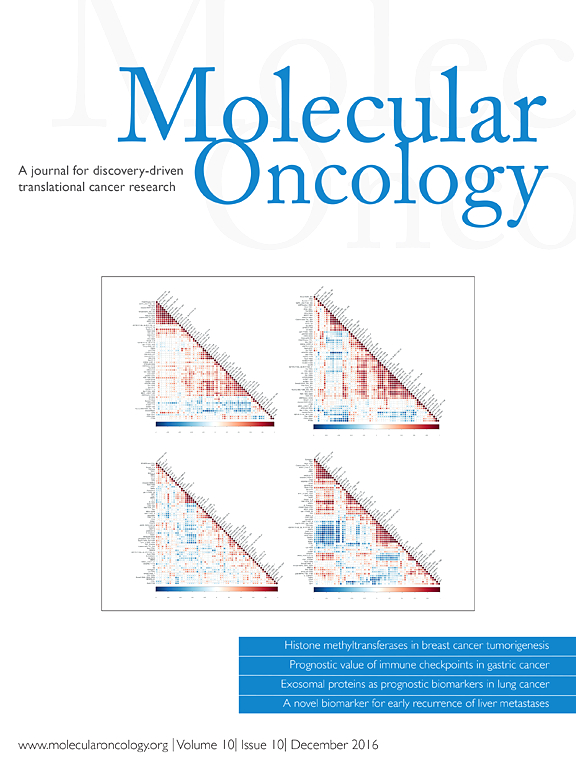通过上调PD-L1增强免疫疗法:抗PD-L1与mTOR抑制剂的组合前景广阔
IF 6.6
2区 医学
Q1 Biochemistry, Genetics and Molecular Biology
引用次数: 0
摘要
以程序性细胞死亡蛋白1(PD-1)/程序性细胞死亡配体1(PD-L1)通路为靶点的免疫检查点抑制剂(ICIs)改变了尿路癌(UC)的治疗。PD-L1 表达与 ICI 疗效之间的相关性尚不确定,因此 PD-L1 作为 ICI 疗效预测标志物的作用尚不明确。在提高 ICI 疗效的几种方法中,有几项试验正在探索在不同肿瘤类型中将 ICI 与丝氨酸/苏氨酸蛋白激酶 mTOR(mTOR)抑制剂联合使用。mTOR 抑制剂与 PD-L1 表达在 UC 中的潜在相互作用尚未得到很好的描述。在我们的研究中,我们调查了磷酸肌酸3-激酶(PI3K)/AKT/mTOR通路抑制剂(TAK-228、依维莫司和TAK-117)如何影响临床前膀胱癌细胞模型中PD-L1的表达和功能。在七种细胞系中,除一种细胞系外,TAK-228都能提高细胞表面糖基化PD-L1的水平,与基线水平无关。TAK-228能促进表皮生长因子(EGF)和干扰素-β(IFNβ)的分泌,两者都与PD-L1蛋白的诱导有关。阻断EGF和IFNβ受体可逆转TAK-228诱导的PD-L1增加。此外,TAK-228还增强了IFN-γ诱导的PD-L1表达和某些细胞内的HLA-I水平。经 TAK-228 处理的膀胱癌细胞对外周血单核细胞(PBMC)和分化集群 8(CD8)+ T 细胞的细胞毒作用表现出抵抗力。添加抗 PD-L1 抗体可减轻 T24 细胞的这种抗药性。经体内外处理的患者衍生外植体(PDEs)证实,在TAK-228暴露下PD-L1表达增加。这些临床前研究结果表明,用TAK-228抑制mTOR可增加PD-L1水平,从而可能影响针对UC细胞的特异性免疫反应。这凸显了在晚期 UC 患者中探索 mTOR 抑制剂与 ICIs 联用的合理性。本文章由计算机程序翻译,如有差异,请以英文原文为准。
Enhancing immunotherapy through PD‐L1 upregulation: the promising combination of anti‐PD‐L1 plus mTOR inhibitors
Immune checkpoint inhibitors (ICIs) targeting the programmed cell death protein 1 (PD‐1)/programmed cell death 1 ligand 1 (PD‐L1) pathway have transformed urothelial cancer (UC) therapy. The correlation between PD‐L1 expression and ICI effectiveness is uncertain, leaving the role of PD‐L1 as a predictive marker for ICI efficacy unclear. Among several ways to enhance the efficacy of ICI, trials are exploring combining ICIs with serine/threonine‐protein kinase mTOR (mTOR) inhibitors in different tumor types. The potential interaction between mTOR inhibitors and PD‐L1 expression in UC has not been well characterized. In our study, we investigated how phosphoinositide 3‐kinase (PI3K)/AKT/mTOR pathway inhibitors (TAK‐228, everolimus and TAK‐117) affect PD‐L1 expression and function in preclinical bladder cancer cell models. TAK‐228 increased cell surface levels of glycosylated PD‐L1 in all but one of the seven cell lines, regardless of baseline levels. TAK‐228 promoted the secretion of epidermal growth factor (EGF) and interferon‐β (IFNβ), both linked to PD‐L1 protein induction. Blocking EGF and IFNβ receptors reversed the TAK‐228‐induced PD‐L1 increase. Additionally, TAK‐228 enhanced IFN‐γ‐induced PD‐L1 expression and intracellular HLA‐I levels in some cells. TAK‐228‐treated bladder cancer cells exhibited resistance to the cytotoxic effects of peripheral blood mononuclear cells (PBMCs) and cluster of differentiation 8 (CD8)+ T cells. The addition of an anti‐PD‐L1 antibody diminished this resistance in T24 cells. Increased expression of PD‐L1 under TAK‐228 exposure was confirmed in patient‐derived explants (PDEs) treated ex vivo . These preclinical findings suggest that mTOR inhibition with TAK‐228 can increase PD‐L1 levels, potentially impacting the specific immune response against UC cells. This highlights the rationale for exploring the combination of mTOR inhibitors with ICIs in patients with advanced UC.
求助全文
通过发布文献求助,成功后即可免费获取论文全文。
去求助
来源期刊

Molecular Oncology
Biochemistry, Genetics and Molecular Biology-Molecular Medicine
CiteScore
11.80
自引率
1.50%
发文量
203
审稿时长
10 weeks
期刊介绍:
Molecular Oncology highlights new discoveries, approaches, and technical developments, in basic, clinical and discovery-driven translational cancer research. It publishes research articles, reviews (by invitation only), and timely science policy articles.
The journal is now fully Open Access with all articles published over the past 10 years freely available.
 求助内容:
求助内容: 应助结果提醒方式:
应助结果提醒方式:


